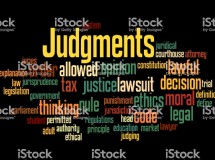Everyone has some kind of secret in the past. It may be something harmless but embarrassing, like working part-time as a mascot for a fast food chain at sixteen. On the other hand, a secret can also be serious, like being fired from previous jobs due to excessive absenteeism. Indeed, there are some secrets that are darker than most. If you are an employer, part of your task is unearthing your potential employees’ skeletons in the closet through a background check.
Doing a background check doesn't mean that you have to know all the intimate details of an applicant's life. But this also doesn't mean you need to take at face value everything he wrote in his resume and said in his interview. A thorough background check determines whether or not his credentials are true. A background check will also inform you if the previous companies he worked with only have good things to say about him in terms of character as a person and performance as an employee.
Does the applicant have a criminal record? If yes, how serious is it? As an employer, you are responsible for keeping your employees safe, and one way to do that is ensuring your workplace is free from unreformed criminals. Without a background check, you risk hiring a convicted murderer who escaped prison. Sounds paranoid? Maybe, but that scenario is not impossible if you skip on a background check. It’s better to be safe than sorry.
Aside from fishing out even the most-hidden criminal records, a thorough background check also weeds out liars who embellish their resumes. An applicant may think a few exaggerations and fabrications in his resume are harmless, but what does that say about his character? A background check will identify the person who truly fits the job you’re trying to fill in and differentiate him from someone trying to get in under false credentials. After all, you want a qualified position for the job to make sure that it gets done right. Besides, how can you trust a liar with your company’s sensitive data and processes? This alone should give you a clear picture of how important a background check is.
When doing a background check, you can verify information such as criminal records, official transcript of records, character references, certificates of employment from previous employers, and even credit score. A credit score at first may not be an obvious choice to be part of a background check, but a good score is a good indicator responsibility and diligence. Most of the pertinent information you need to include in your background check is usually public information anyway, so there’s no excuse for you to skip on doing a background check.
You should hire the applicant under no false pretenses, and a background check can assure you that you’ve done so. If you do a thorough background check on applicants before you hire them, you will have a safer and more secure workplace filled with competent and trustworthy employees.
Doing a background check doesn't mean that you have to know all the intimate details of an applicant's life. But this also doesn't mean you need to take at face value everything he wrote in his resume and said in his interview. A thorough background check determines whether or not his credentials are true. A background check will also inform you if the previous companies he worked with only have good things to say about him in terms of character as a person and performance as an employee.
Does the applicant have a criminal record? If yes, how serious is it? As an employer, you are responsible for keeping your employees safe, and one way to do that is ensuring your workplace is free from unreformed criminals. Without a background check, you risk hiring a convicted murderer who escaped prison. Sounds paranoid? Maybe, but that scenario is not impossible if you skip on a background check. It’s better to be safe than sorry.
Aside from fishing out even the most-hidden criminal records, a thorough background check also weeds out liars who embellish their resumes. An applicant may think a few exaggerations and fabrications in his resume are harmless, but what does that say about his character? A background check will identify the person who truly fits the job you’re trying to fill in and differentiate him from someone trying to get in under false credentials. After all, you want a qualified position for the job to make sure that it gets done right. Besides, how can you trust a liar with your company’s sensitive data and processes? This alone should give you a clear picture of how important a background check is.
When doing a background check, you can verify information such as criminal records, official transcript of records, character references, certificates of employment from previous employers, and even credit score. A credit score at first may not be an obvious choice to be part of a background check, but a good score is a good indicator responsibility and diligence. Most of the pertinent information you need to include in your background check is usually public information anyway, so there’s no excuse for you to skip on doing a background check.
You should hire the applicant under no false pretenses, and a background check can assure you that you’ve done so. If you do a thorough background check on applicants before you hire them, you will have a safer and more secure workplace filled with competent and trustworthy employees.
SHARE








































